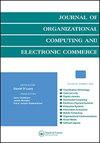AN ONTOLOGY BASED PRODUCT RECOMMENDATION SYSTEM FOR NEXT GENERATION E-RETAIL
IF 1.9
4区 管理学
Q3 COMPUTER SCIENCE, INFORMATION SYSTEMS
Journal of Organizational Computing and Electronic Commerce
Pub Date : 2023-04-03
DOI:10.1080/10919392.2023.2226542
引用次数: 0
Abstract
ABSTRACT The number of e-commerce resources has increased considerably. Thus, it has become important for sellers to be able to quickly recommend products to potential buyers. Some product recommendation systems developed for this purpose. However, due to the lack of semantics, the systems’ success in recommending accurate products according to user preferences is low. In this study carried out within the scope of a state-funded R&D project, an ontology-based personalized product recommendation system named E-Prod was developed. E-Prod tracks various e-commerce systems in real time and transfers the product information to the ontology model. E-Prod uses a novel recommendation approach that combines machine learning and semantic matching to provide personalized recommendations. The system learns user’s preferences based on semantic relationships between products by monitoring their behaviors. In this way, accurate recommendations are made by semantic matching between products and user preferences. E-Prod has been tested with over 250 registered users and compared to traditional collaborative recommendations in terms of accuracy, precision, and recall. As a result, E-Prod outperformed traditional methods by 92.79% accuracy, 92.93% precision, and 90.58% recall. Within the scope of this study, E-Prod covers the clothing, shoes, and bag retail sectors. However, it provides a generic infrastructure for new generation e-commerce systems. Its reusable modules can be adapted to any domain.面向下一代电子零售的基于本体的产品推荐系统
电子商务资源的数量大幅增加。因此,对于卖家来说,能够快速向潜在买家推荐产品变得非常重要。为此目的开发了一些产品推荐系统。然而,由于缺乏语义,系统在根据用户偏好推荐准确产品方面的成功率很低。本研究是在国家资助研发项目的范围内进行的,开发了一个基于本体的个性化产品推荐系统E-Prod。E-Prod实时跟踪各类电子商务系统,并将产品信息传递到本体模型中。E-Prod采用了一种新颖的推荐方法,将机器学习和语义匹配相结合,提供个性化的推荐。该系统通过监测用户的行为,根据产品之间的语义关系来学习用户的偏好。这样,通过产品与用户偏好之间的语义匹配,做出准确的推荐。E-Prod已经在250多名注册用户中进行了测试,并在准确性、精密度和召回率方面与传统的协作推荐进行了比较。结果表明,E-Prod的准确率为92.79%,精密度为92.93%,召回率为90.58%,优于传统方法。在这项研究的范围内,E-Prod涵盖了服装、鞋子和手袋零售行业。然而,它为新一代电子商务系统提供了通用的基础设施。它的可重用模块可以适应任何领域。
本文章由计算机程序翻译,如有差异,请以英文原文为准。
求助全文
约1分钟内获得全文
求助全文
来源期刊

Journal of Organizational Computing and Electronic Commerce
工程技术-计算机:跨学科应用
CiteScore
5.80
自引率
17.20%
发文量
7
审稿时长
>12 weeks
期刊介绍:
The aim of the Journal of Organizational Computing and Electronic Commerce (JOCEC) is to publish quality, fresh, and innovative work that will make a difference for future research and practice rather than focusing on well-established research areas.
JOCEC publishes original research that explores the relationships between computer/communication technology and the design, operations, and performance of organizations. This includes implications of the technologies for organizational structure and dynamics, technological advances to keep pace with changes of organizations and their environments, emerging technological possibilities for improving organizational performance, and the many facets of electronic business.
Theoretical, experimental, survey, and design science research are all welcome and might look at:
• E-commerce
• Collaborative commerce
• Interorganizational systems
• Enterprise systems
• Supply chain technologies
• Computer-supported cooperative work
• Computer-aided coordination
• Economics of organizational computing
• Technologies for organizational learning
• Behavioral aspects of organizational computing.
 求助内容:
求助内容: 应助结果提醒方式:
应助结果提醒方式:


